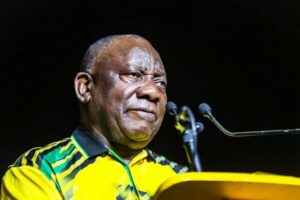
In the two years since he was elected, Kenya’s President William Ruto has captivated global climate activists under the Eiffel Tower, mingled with global tech titans in Silicon Valley, and was celebrated as a global peacekeeper at the White House. Despite his numerous foreign trips, citizens back home have endured severe economic hardship. Already burdened by a cost-of-living crisis and witnessing government officials benefiting from their positions, Kenyans compelled Ruto to abandon plans to implement steep tax hikes after days of protests.
Please take note of the following text:
The U-turn has revealed the contrast between the perception of Ruto as the influential global representative not only of Kenya but of the entire continent, and the harsh realities his country is dealing with – burdened by debt, corruption, and security challenges. This has significantly weakened his position within the country, with his administration divided in its response and his opponents reenergized, aiming to capitalize on the growing discontent leading up to the 2027 elections, as stated by analysts and politicians.
“Enslaved and supported by foreign interests, and never pro-people in its outlook and interests, (Ruto’s administration) was bound to face the consequences of its priorities,” Willy Mutunga, Kenya’s former chief justice, told Reuters. “As long as the material interests of the youth are not addressed, the chasm grows bigger and bigger,” he said. A spokesperson for Ruto did not respond to requests for comment. Kenya – already one of Africa’s biggest economies and strongest democracies – has in recent years expanded its global role. On the eve of the climax of the protests, Ruto flagged off 400 policemen to lead a stabilization force in Haiti.
The U.S. has designated Kenya as a major non-NATO ally, the first in sub-Saharan Africa, which gives it access to training and equipment but does not oblige it to join NATO operations. Earlier this month, Ruto spoke at the G7 summit about the need to reform the global financial system to help the poor and has emerged as a powerful advocate for Africa in calls for action on climate change.
With protests breaking out across the country, including in Ruto’s hometown of Eldoret, and increasing calls for his resignation, some analysts believe that his administration is struggling to stay in power. If Ruto focuses more on addressing domestic issues, there’s a risk that Western powers could lose the support of one of their strongest allies in the competition for influence in Africa. Diplomats and analysts say that in Africa, where they aim to counter the growing influence of Russia and China, Western powers could lose focus.
Ruto has offered dialogue to allay the fears of protesters but it is not clear if that will be accepted or who the talks would be with. He must also come up with a new plan to tackle Kenya’s economic challenges, likely a hard sell due to the deficit cuts he will need to make to meet the conditions of international lenders for future funding. “Even if nationwide demonstrations dissipate, this civil disobedience is a generation-defining moment,” said Declan Galvin, managing director of Nairobi-based Exigent Risk Advisory, a consultancy.
“The next election is still several years away but Ruto clearly needs to shift his political position to address public needs for his own political survival.” ‘Brazen arrogance’ Ruto has earned a reputation for a fierce work ethic but has struggled to shake an indictment by the International Criminal Court for his role in post-election violence in 2007-8 even after the court dropped the case.
Gabrielle Lynch, a Kenya expert at the University of Warwick in the UK, said that Ruto was “an incredible performer”, able to roll out facts and figures for donors and then adapt his body language and tone for a local rally later the same day. “It is as if presenting himself as a world leader would help legitimize him at home and remove tag of the parochial instigator of violence,” Lynch said.
Underscoring the scale of his globe-trotting, Ruto went on a total of 62 trips to 38 countries in his first 20 months in power, according to a tally by Kenya’s Daily Nation newspaper. But when home, Ruto has appeared tone-deaf to complaints over the direction the country was taking, according to two sources in regular contact with his office.
During his campaign, Ruto presented himself as an advocate for low-income individuals, but his opponents have nicknamed him “Zakayo,” which means a greedy tax collector in Swahili, referencing the Bible. In response to the proposed tax increases, protests have erupted, and videos of politicians displaying their wealth have been widely shared. The homes and businesses of lawmakers who backed the tax hikes have been targeted.
Mutula Kilonzo Jr., a member of the opposition and the governor of Makueni County, mentioned that the bold and unapologetic behavior of government officials has intensified the dissatisfaction.
Anger has also been directed at the World Bank and the International Monetary Fund (IMF), seen as the driving forces behind Ruto’s fiscal policies. Since his reversal on tax increases, Ruto must now find another way to make his nation’s debt pile of around $80 billion, which is approximately 70% of GDP, more manageable.





